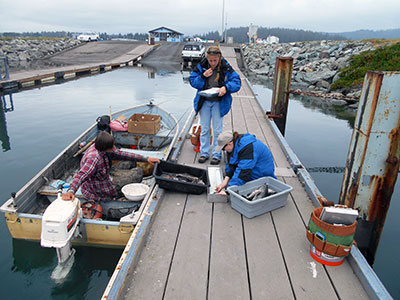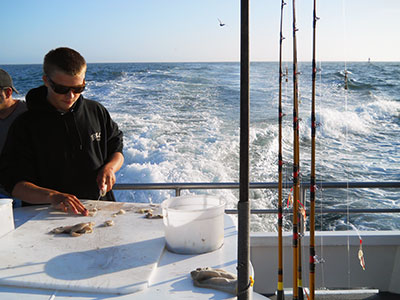Angler cooperation is critical to the success of the survey. Angler participation is essential to ensure accurate data collection and sustainable management of California's marine recreational fisheries.
A Message to Recreational Anglers
 Two CRFS samplers
Two CRFS samplers
CDFW asks anglers to do their part to help manage California's marine recreational fisheries!
Avid sport anglers have most likely already seen the smiling faces and brown polo shirts of California Recreational Fisheries Survey (CRFS) samplers. The data provided by the interview helps fishery managers set size limits, bag limits and fishing seasons with the goal of maximizing fishing opportunity while conserving the fish species for generations to come. Fishery managers use CRFS to estimate the total catch (total number of fish caught) and fishing effort (number of fishing trips) of marine recreational anglers in California. CRFS was designed to meet specific management needs for all of California’s diverse recreational marine finfish fisheries, and provide accurate and timely estimates. The accuracy of the estimates generated by CRFS depends heavily on angler cooperation.
There are two ways that recreational anglers can contribute to the accuracy of the data:
- Anglers should cooperate with the CRFS sampler conducting the interview. Please answer the CRFS interview questions truthfully. Take the time to allow the sampler to examine and measure any catch. As a result of increased sampling levels, recreational anglers, particularly those who fish frequently, are more likely to encounter CRFS samplers conducting the survey. Every fishing trip is different—different target species, success rates, different locations, different gear, etc— so we ask anglers, "Even if you have completed this survey before, please cooperate each time you are asked!"
- Say "yes" to the CRFS telephone surveyor. Licensed anglers are contacted randomly throughout the year and asked questions about their fishing habits. Data collected through this telephone survey are used to estimate fishing effort that cannot be estimated through field observations, such as night fishing and fishing from boats that depart from and return to private marinas. Personal contact information is kept confidential.
A Reminder for CPFV Owners, Operators and Anglers
 Velocity Deckhand
Velocity Deckhand
The cooperation of owners and operators of commercial passenger fishing vessels (CPFVs) has been critical to the success of CRFS since its inception in 2004. Onboard and dockside sampling of CPFVs by CRFS samplers will continue. CPFV operators and anglers are reminded that accurate catch and effort estimates depend on the catch (including discard data) collected by CRFS samplers while onboard CPFVs. In addition, CRFS samplers must observe both open-party and charter trips, and must gather effort data to ensure the best possible estimates.
By law (Section 105.5, Title 14, California Code of Regulations), owners or operators of CPFVs must carry and accommodate CRFS samplers on fishing trips when asked. Samplers will ask to observe both charter and open-party fishing trips. If observer coverage of a trip is denied by the owner or operator of the vessel, CDFW may request a written explanation for the denial, and CPFV owners or operators who deny observer coverage of a trip may have their fishing permits or licenses revoked.
Anglers are encouraged to answer the CRFS sampler's questions; however, angler participation in the survey is voluntary. The sampler will ask anglers onboard CPFVs about the species they intend to target, how often they fish, and the county in which they live. While anglers are fishing, the sampler will collect data on the catch rate, the species composition of the catch, the fishing location and conditions, and length and weight of fish that the anglers do not keep. After anglers have completed fishing for the day, CRFS samplers will record lengths and weights of kept fish.